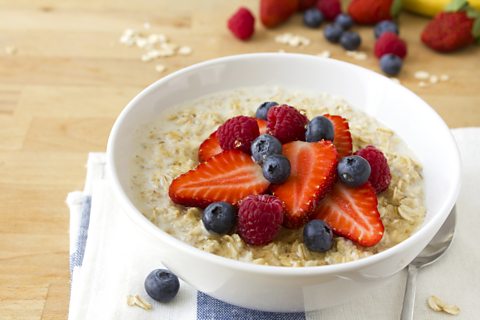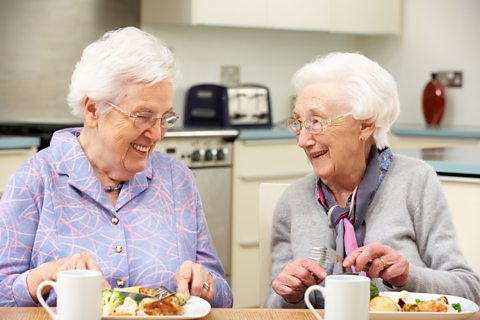Factors influencing special diets
There are a number of factors that influence the need for special diets:
- Age
- Heath issues
- Cultural/religious considerations
- Ethical reasons
- Food allergies/food intolerance
Age groups
Children
Children require the same variety of food from the Eatwell Guide as adults but in smaller portions.
Their bodies are growing so they need:
- Body building foods to supply protein for growth (meat, milk, fish, eggs, and cheese, pulses)
- Mineral calcium and Vitamin D which are essential for strong teeth and bones therefore full cream milk and cheese are extremely important
- Starchy carbohydrates (bread, potatoes, pasta, rice) to provide energy as children are very active
- Some fat is needed to provide fat soluble vitamins (A, D, E, K), and to insulate the body
- Fruit and vegetables to provide vitamins especially vitamin C
Meals should be small and given at regular intervals to keep blood sugar levels low.
Children should be encouraged to drink water to keep them hydrated.
Fresh foods should be used as they have the maximum nutritional value when cooked properly.
Include a variety of colours and textures to encourage children to eat different foods.
Processed foods should be avoided especially those with additives that can cause hyperactivity.
Sugary foods should be kept to minimum as they can cause tooth decay. Excess sugar, not used for energy will be converted to fat and lead to childhood obesity.
Those responsible for providing meals in day nurseries and primary schools must apply these guidelines when drawing up menus.
Teenagers
Many of the same rules apply when providing food for teenagers, as they are still growing.
Many teenagers skip breakfast at home so the food on offer in schools and colleges should include starchy carbohydrates for slow release energy, fresh fruit juice for vitamin C and eggs for protein (growth).

Porridge, muesli and wholemeal toast are good for slow rease energy.
This age group can drink semi skimmed milk for building and maintaining strong teeth and bones.
Fried food should be avoided but grilled alternatives provide a healthier option.
At lunch time many schools offer a salad bar and chips are seldom on the menu to reduce fat. This is to encourage pupils to make healthy food choices based on the Eatwell Guide.
Elderly people
As people age their dietary requirements change.
They may have difficulty eating firmer foods because they use dentures or have problems swallowing.
They may have problems digesting some foods.
They may become depressed and loose interest in eating.
They may require help with eating because of poor mobility as a result of conditions like arthritis or a stroke.
The commercial service sector providers like hospitals and residential homes have a responsibility to provide high quality food to meet the special diets required by this group.

Elderly people have more complex dietary requirements than other adults.
When planning meals for elderly people there are some important things to remember:
- The body of an elderly person is slowing down so although the amount of food required may be less there must still be enough variety to meet nutritional needs.
- Small portions of attractively served fresh food are important to encourage elderly people to eat.
- The texture of food is important. Soft, moist food should be served to help make chewing and swallowing easier. One dish meals like chicken and broccoli bake are easy to eat and are high in nutritional value.
- Although they have stopped growing, elderly people still need protein for repair and maintenance of body tissue. This can be supplied by fish, eggs, milk, chicken, meat, cheese and plant based protein foods like Quorn.
- Vitamin D is very important as they may not be able to go outside and get it from natural sunlight. A lack of Vitamin D can lead to bone density loss and a condition known as osteoporosis. As a result, elderly people are at greater risk of falling and breaking a bone. Oily fish and bread are good sources of vitamin D.
- Dairy foods like milk, yogurt and cheese are important to supply calcium for maintenance of bones. To avoid too much fat in the diet low fat versions of dairy foods should be used, like skimmed milk and low fat yogurts.
- Older people who do not have a balanced diet can easily suffer from a type of anaemia resulting from a lack of Vitamin B12. This vitamin is supplied by animal foods and is added to breakfast cereals.
- A good variety of fresh fruit and vegetables especially green vegetables, oranges and kiwi to provide Vitamin C is essential to help the body use iron. These two nutrients are needed for heathy red blood cells to prevent anaemia, which is very common in older people.